MEMORANDUM
RE: Clean Slate Survey Poll Results
This memorandum is based on an online survey of 470 respondents from the wealthiest Congressional Districts in the United States and 479 respondents from the least wealthy Congressional Districts in the United States. The survey was fielded October 14-17, 2021, and the margin of error is +/- 3.1%.
Overview
National Research Inc. is pleased to present poll findings from an online survey we conducted among respondents who reside in the 100 wealthiest and the 100 poorest congressional districts across the United States. The topic of the survey was criminal justice reform. Our findings show that there is widespread agreement among respondents when it comes to the issues and proposals we tested. Put another way, respondents who live in the wealthiest congressional districts and respondents who live in the least wealthy districts find a lot of common ground and agreement on a wide variety of criminal justice reform issues.
Key Findings
- We asked respondents from both the 100 wealthiest and 100 poorest Congressional Districts around the country whether they believe it is fair that many people are faced with social and economic restrictions after being charged with non-violent crimes.
- Levels of bipartisan agreement were nearly identical among both wealthy and non-wealthy respondents. The groups share a belief that it is unfair that the current criminal justice system places economic restrictions on those trying to rehabilitate their lives after committing non-violent crimes.
- Measures such as the Clean Slate Act that provide individuals who have paid their debts the ability to clean their record of past offenses to rebuild their lives enjoyed particularly robust support.
- On a bipartisan basis, respondents living in both wealthy and non-wealthy CD’s agreed that allowing those who commit non-violent crimes to expunge their records would benefit employers seeking help, the national economic recovery, and reduce recidivism.
Question Wording:
Many people who have served their time find it difficult to find jobs and housing due to criminal background checks. As a result, even low-level offenses can become a life sentence. Do you think it is fair or unfair that non-violent offenders who have served their time, paid their debt to society, behaved well for years, and are trying to rehabilitate their lives are often barred from jobs, education, and housing because of their criminal record?
Results:
| Fair | Neutral | Unfair | |
| Total | 21% | 14% | 55% |
| Wealthiest | 20% | 13% | 57% |
| Poorest | 20% | 16% | 54% |
| GOP | 24% | 15% | 50% |
| Dem | 24% | 11% | 60% |
| Ind/Unaff | 12% | 18% | 54% |
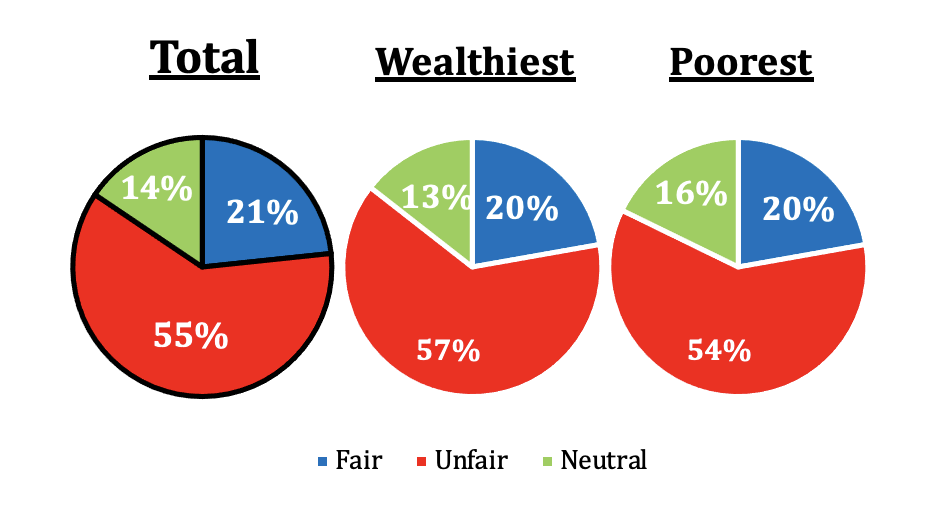
Question Wording:
Hundreds of thousands of Americans have a criminal record due to offenses dealing with marijuana. This can make it difficult to find jobs, get licenses, and even housing. As states move toward legalizing marijuana, do you support or oppose having those previously convicted of low-level marijuana offenses, many of which are now legal, to have their records expunged or deleted?
Results:
| Support | Neutral | Oppose | |
| Total | 58% | 16% | 15% |
| Wealthiest | 61% | 15% | 14% |
| Poorest | 57% | 15% | 16% |
| GOP | 50% | 17% | 22% |
| Dem | 71% | 11% | 11% |
| Ind/Unaff | 49% | 20% | 14% |
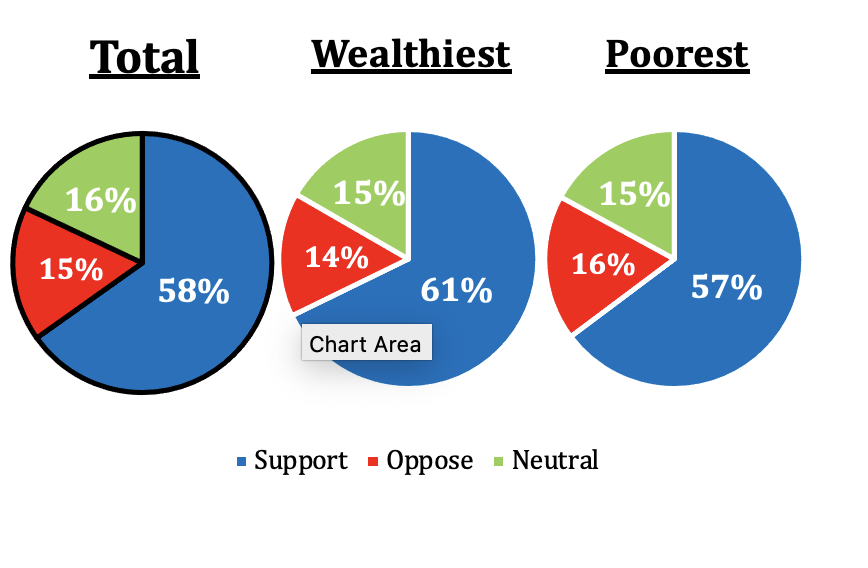
Question Wording:
Clearing low level non-violent offenses from background checks is critical for employment opportunities but can be a very costly process which disadvantages poor people who cannot afford to hire a lawyer. As a result, those most in need of better employment are trapped. Do you support or oppose creating a streamlined process that authorizes judges to automatically expunge records of non-violent offenders if they meet certain reasonable standards?
Results:
| Support | Neutral | Oppose | |
| Total | 61% | 17% | 12% |
| Wealthiest | 61% | 16% | 12% |
| Poorest | 61% | 17% | 12% |
| GOP | 54% | 17% | 18% |
| Dem | 73% | 13% | 9% |
| Ind/Unaff | 50% | 21% | 11% |
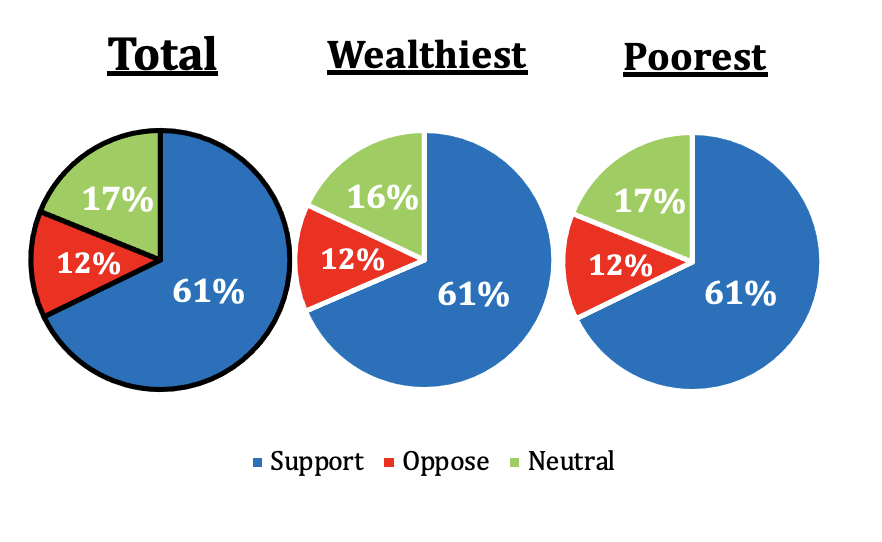
Question Wording:
Often defendants will be charged with multiple offenses and a jury finds them not guilty of some crimes. Do you believe it is fair or unfair for a judge to use charges for which a defendant was found not guilty as a basis for increasing punishment for other crimes?
Results:
| Fair | Neutral | Unfair | |
| Total | 19% | 16% | 51% |
| Wealthiest | 19% | 15% | 54% |
| Poorest | 18% | 18% | 49% |
| GOP | 23% | 18% | 49% |
| Dem | 23% | 13% | 54% |
| Ind/Unaff | 7% | 19% | 50% |
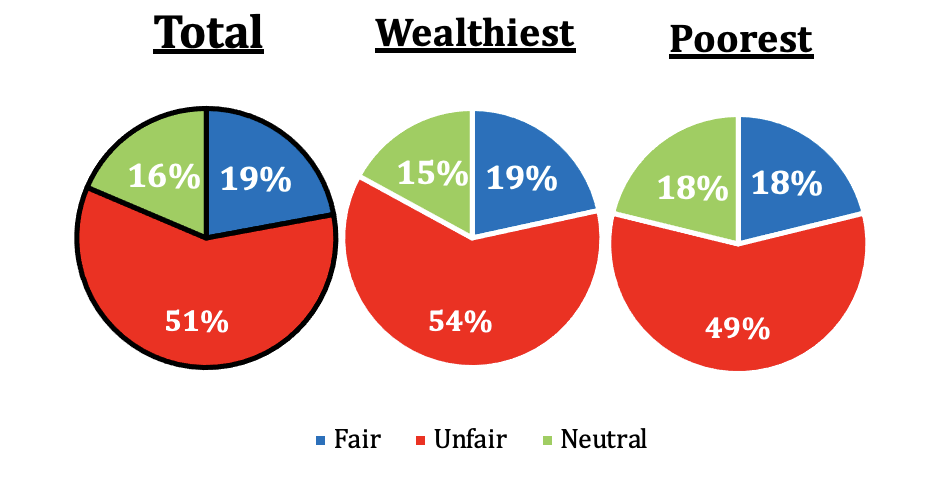
Question Wording:
Often someone is arrested, not charged, or found not guilty by a jury, yet the arrest is listed on background checks which prevents people from getting jobs, education, and housing. Do you support or oppose taking action to prevent arrests that don’t result in a conviction from appearing on a background check?
Results:
| Support | Neutral | Oppose | |
| Total | 57% | 16% | 16% |
| Wealthiest | 58% | 14% | 16% |
| Poorest | 56% | 18% | 14% |
| GOP | 55% | 16% | 18% |
| Dem | 63% | 13% | 15% |
| Ind/Unaff | 50% | 18% | 13% |
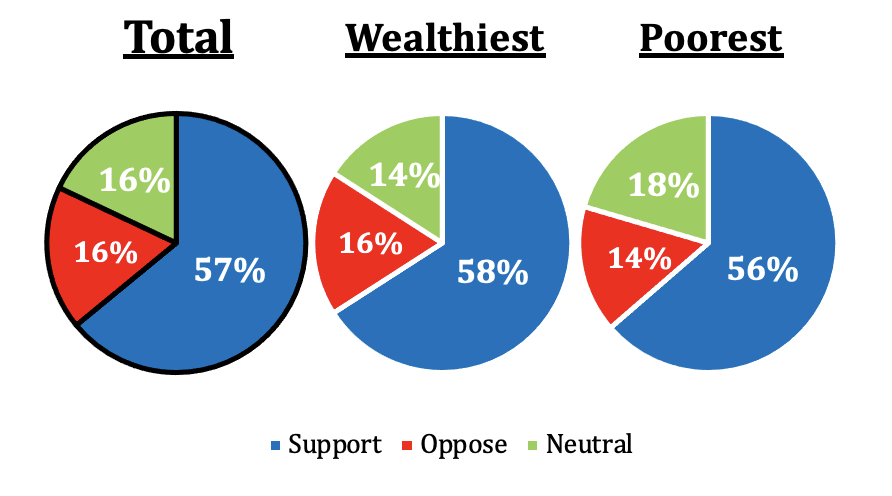
Question Wording:
Do you support or oppose Congress moving forward with additional legislation to reform the criminal justice system in the United States?
Results:
| Support | Neutral | Oppose | |
| Total | 59% | 15% | 13% |
| Wealthiest | 60% | 14% | 13% |
| Poorest | 58% | 16% | 13% |
| GOP | 49% | 17% | 20% |
| Dem | 77% | 9% | 6% |
| Ind/Unaff | 43% | 19% | 15% |
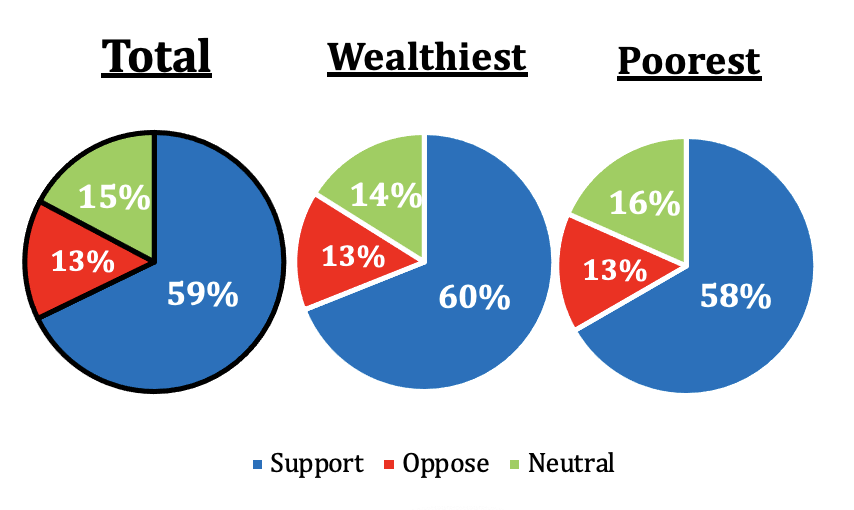
Question Wording:
Tens of thousands of Americans have been excluded from the workforce due to low-level, non-violent offenses appearing on a background check. When many businesses are struggling to find workers, do you agree or disagree that allowing prospective employees to expunge their records would be a positive step to help companies to hire more employees and help our economy recover?
Results:
| Agree | Neutral | Disagree | |
| Total | 59% | 16% | 13% |
| Wealthiest | 59% | 14% | 14% |
| Poorest | 59% | 19% | 11% |
| GOP | 53% | 16% | 18% |
| Dem | 72% | 11% | 9% |
| Ind/Unaff | 45% | 23% | 13% |
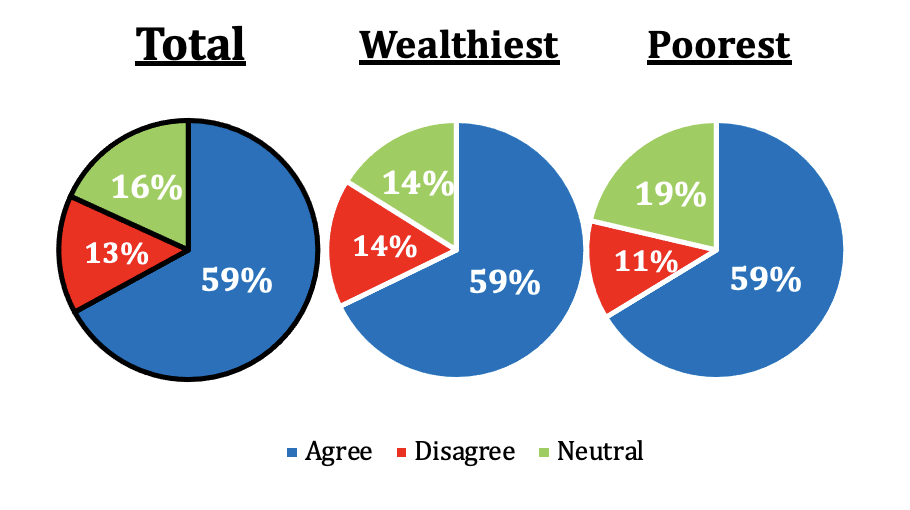
Question Wording:
Many offenders who have served their time for non-violent offenses often find it difficult to find employment due to their record. The inability to start fresh and find employment pushes some people to commit new crimes and go back to jail, which is costly to taxpayers. Do you agree or disagree that allowing non-violent offenders to expunge their records is an important step in helping people rebuild their lives and reducing crime in America?
Results:
| Agree | Neutral | Disagree | |
| Total | 62% | 15% | 12% |
| Wealthiest | 61% | 15% | 13% |
| Poorest | 63% | 15% | 11% |
| GOP | 55% | 16% | 18% |
| Dem | 75% | 11% | 7% |
| Ind/Unaff | 51% | 20% | 10% |
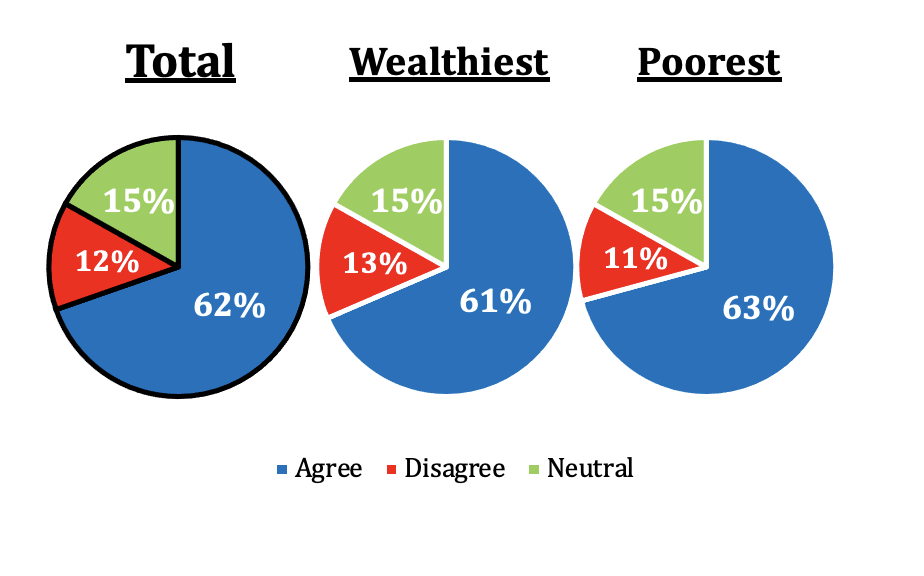
Final Conclusions
- Despite income inequality being a hotly debated political issue as of late, wealthy and non-wealthy respondents from both political parties answered similarly to many of the questions in the survey.
- Wealthy and non-wealthy respondents from both political parties generally agreed that the current state of the United States criminal justice system puts non-violent offenders at a severe socioeconomic disadvantage and that legislation is necessary to reform the current system and make it fairer and more equal for all Americans.
- The strength, depth, and breadth of support for reforms highlighted in this survey provide a solid foundation for building a bipartisan Congressional coalition to advance legislation that increases fairness in the system and opportunities to rebuild lives after prior offenses.